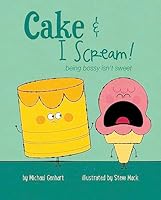- Welcome to FictionDB, Guest
- | My Account
- | Help

Cake & I Scream!...Being Bossy Isn't Sweet — Michael Genhart
buy the book from amazon
Paperback editions:
Hardcover editions:
eBook editions:
Audio editions:
Large Print editions:
Browse Similar Books at Amazon
Children's Books->Humor
Children's Books->Growing Up & Facts of Life->Friendship, Social Skills & School Life->Emotions & Feelings
Children's Books->Growing Up & Facts of Life->Friendship, Social Skills & School Life->Friendship
Children's Books->Growing Up & Facts of Life->Friendship, Social Skills & School Life->Manners
Description
Best friends Cake and Ice Cream love having fun and going to parties! But when Ice Cream tries to get his way by being bossy and loud, he feels all alone. With Cake's help, he has an important realization which changes his bossy ways...and becomes his sweet, soft self again!
Includes a Note to Parents, Caregivers, and Educators with more information about bossy behavior, and strategies to help guide children to behave assertively while still being mindful of others' feelings.
Cake & I Scream! …being bossy isn't sweet is part of the Books for Nourishing Friendships Series from Magination Press. Other titles in the series include Mac & Geeeez! ...being real is what it's all about and Peanut Butter & Jellyous ...sometimes friendships get sticky.
From the Note to Parents, Caregivers, and Educators:
While it is normal for kids to exert their independence and will, that does not mean it's okay to do so in ways that upset others. Bossiness is ordering others about in a domineering and oppressive manner. Bossy behaviors in children include: telling other kids what to do (e.g.,
where to sit, who to play with at recess), and what they are doing wrong; interrupting all the time; always needing to win at games; and having trouble waiting for their turn.
There are many reasons children exhibit bossy behavior, including but not limited to: seeking attention when not feeling heard or respected, testing the limits of their authority, having worries or frustrations that their own needs will not be met; expressing an insecurity or low self-esteem; wanting to express power and control (as someone who feels they have none); and a desire to express independence but in an immature manner.
Assertiveness, as opposed to bossiness, is being confident and forceful while still being mindful and sensitive of others. Similarly, being a leader is not about being controlling of others. Non-bossy assertive or leadership behavior is supportive, helps others find their strengths,
encourages problem-solving, promotes respect, and is considerate of the feelings of others. While there are gender differences in how we perceive the same behavior (i.e., girls can be accused of being bossy while boys are seen as leaders), bossy behavior in the context of friendships will surely be experienced by any child as very unpleasant regardless of gender.
Includes a Note to Parents, Caregivers, and Educators with more information about bossy behavior, and strategies to help guide children to behave assertively while still being mindful of others' feelings.
Cake & I Scream! …being bossy isn't sweet is part of the Books for Nourishing Friendships Series from Magination Press. Other titles in the series include Mac & Geeeez! ...being real is what it's all about and Peanut Butter & Jellyous ...sometimes friendships get sticky.
From the Note to Parents, Caregivers, and Educators:
While it is normal for kids to exert their independence and will, that does not mean it's okay to do so in ways that upset others. Bossiness is ordering others about in a domineering and oppressive manner. Bossy behaviors in children include: telling other kids what to do (e.g.,
where to sit, who to play with at recess), and what they are doing wrong; interrupting all the time; always needing to win at games; and having trouble waiting for their turn.
There are many reasons children exhibit bossy behavior, including but not limited to: seeking attention when not feeling heard or respected, testing the limits of their authority, having worries or frustrations that their own needs will not be met; expressing an insecurity or low self-esteem; wanting to express power and control (as someone who feels they have none); and a desire to express independence but in an immature manner.
Assertiveness, as opposed to bossiness, is being confident and forceful while still being mindful and sensitive of others. Similarly, being a leader is not about being controlling of others. Non-bossy assertive or leadership behavior is supportive, helps others find their strengths,
encourages problem-solving, promotes respect, and is considerate of the feelings of others. While there are gender differences in how we perceive the same behavior (i.e., girls can be accused of being bossy while boys are seen as leaders), bossy behavior in the context of friendships will surely be experienced by any child as very unpleasant regardless of gender.
CERTAIN CONTENT THAT APPEARS ON THIS PAGE COMES FROM AMAZON. THIS CONTENT IS PROVIDED ‘AS IS’ AND IS SUBJECT TO CHANGE OR REMOVAL AT ANY TIME.


 Amazon UK
Amazon UK